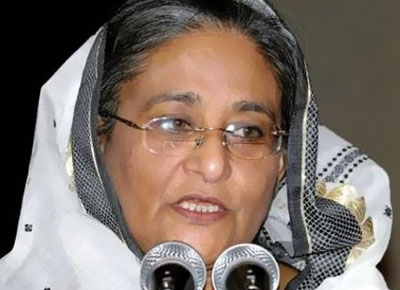2ND LEAD: Investigation into Bangladesh mutiny launched
 Dhaka - Bangladesh Prime Minister Sheikh Hasina Wazed Friday appointed a high-powered committee to launch an investigation into a mutiny at the border guard headquarters in central Dhaka which ended Thursday, officials have confirmed.
Dhaka - Bangladesh Prime Minister Sheikh Hasina Wazed Friday appointed a high-powered committee to launch an investigation into a mutiny at the border guard headquarters in central Dhaka which ended Thursday, officials have confirmed.
Authorities have also appointed Brigadier General Moinul Hossain as new chief of the country's paramilitary Bangladesh Rifles(BDR) force on Friday, as its former director general remains missing, presumably killed, following a mutiny two days ago.
Abul Kalam Azad, Prime Minister Sheikh Hasina's press secretary, said that the government will observe two days of mourning - Saturday and Sunday - following the deaths of the army officers, who will be buried with full state honours. The national flag will be flown at half-mast to show respect to the deceased.
Briefing reporters in Dhaka, Azad said that the general amnesty declared by the prime minister for the rebel soldiers will not be applicable for those who were involved in murder, looting and other crimes they committed during the breach of chain of command.
"The soldiers who have committed crimes during the mutiny will not be spared," he said.
Prime Minister Hasina also visited the Combined Military Hospital in Dhaka to see the bodies of the army officers and consoled their bereaved family members. She also assured their families of government supports.
"A certain quarter was behind the incident as it is not possible to conduct such a major operation by any single person. We will launch an investigation to find out the mastermind of the mutiny," the premier said.
Earlier on Friday rescue team retrieved at least 18 bodies from a mass-grave inside the headquarters of a paramilitary border unit following a search for army officers missing since the beginning of the mutiny.
"Eighteen bodies were retrieved from a mass grave inside the headquarters complex", said sub-inspector Nuruzzamna, an on-duty officer of Lalbagh police station in central Dhaka.
The bodies of the missing officers had been probably dumped there, the police officer said, adding that the search operation conducted by members of the army, police and fire service and the civil defence department was still ongoing.
Police had earlier recovered 21 bodies, mainly officers, from inside and around the BDR compound and its adjoining areas, including storm sewage pipes.
"The army entered the compound with the prime minister's permission to join the ongoing search," said Home Minister Sahara Khatun, who visited the BDR headquarters after the troops' surrender on Thursday.
Several thousand residents and relatives of the missing officers were seen waiting anxiously outside the compound as the rescue teams searched inside.
Meanwhile, police launched a drive to arrest mutineers who fled the headquarters after the rebellion, despite the prime minister offering a general amnesty.
More than 200 soldiers were arrested by Friday morning, with police saying they would face charges of murder, looting and taking hostage civilians and commanders as well as violating the chain of command.
The rebellion ended late Thursday with the surrender of the mutineers, 35 hours after rebelling soldiers opened on their commanders, leaving scores of army officers dead.
The army could not confirm how many of its officers were killed, but survivors said more than 100 were still missing.
The mutiny began Wednesday morning at an annual meeting to allow soldiers to air their grievances to their officers.
Several hundred enlisted men, enraged over a pay dispute and alleged repression and corruption by the commanders of the 67,000- strong force, took the officers hostage and then took control the 2.6-square-kilometre compound, located in a densely populated residential area of Dhaka. (dpa)